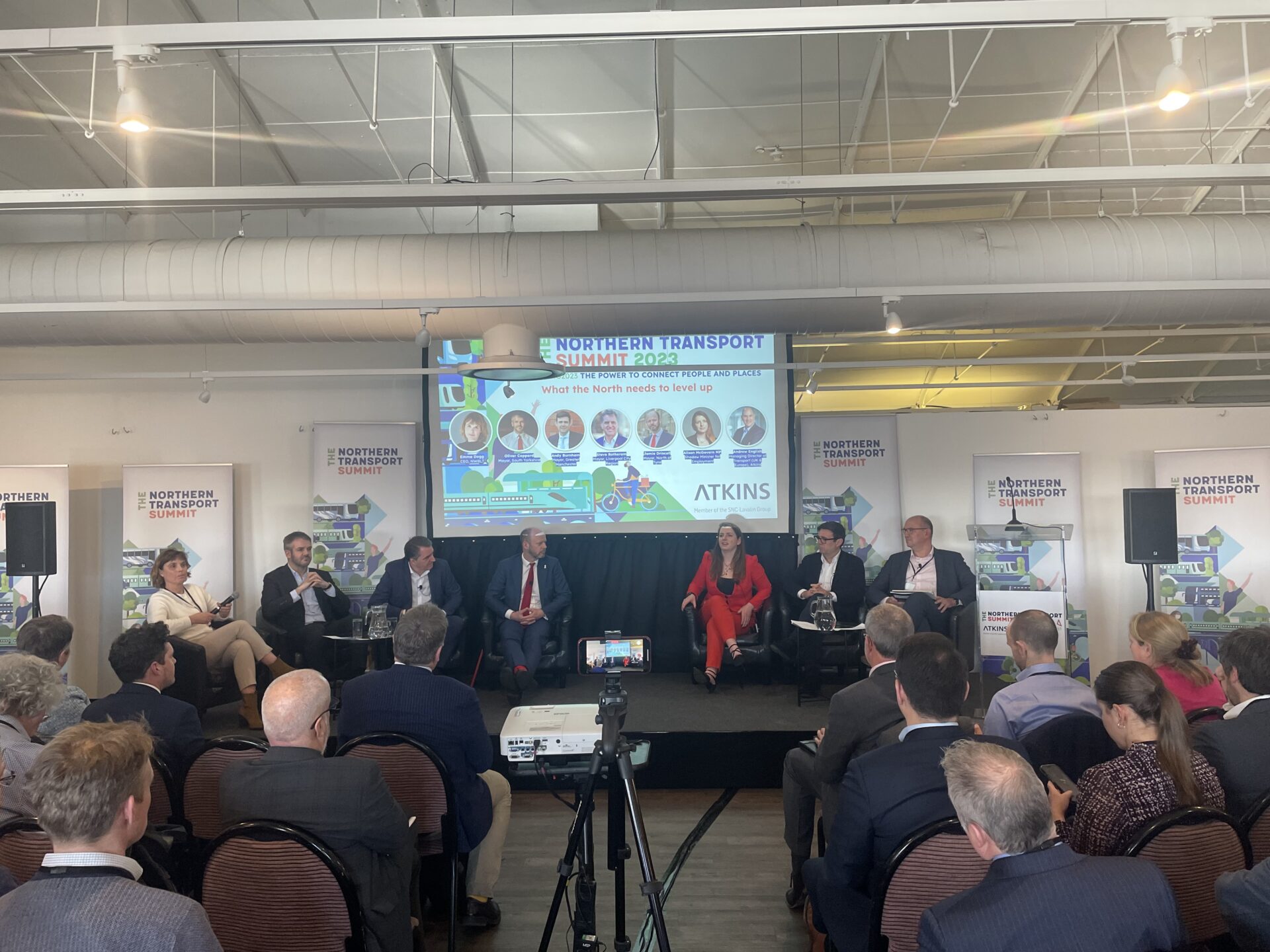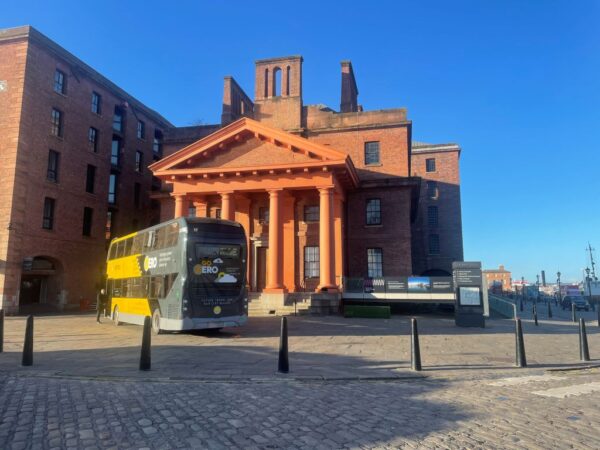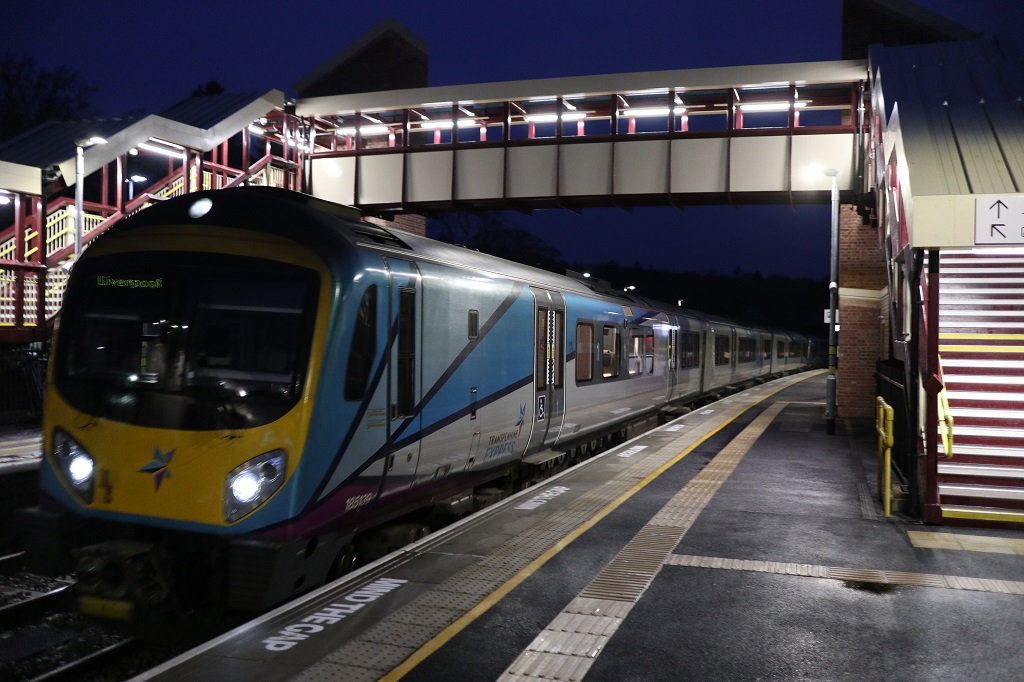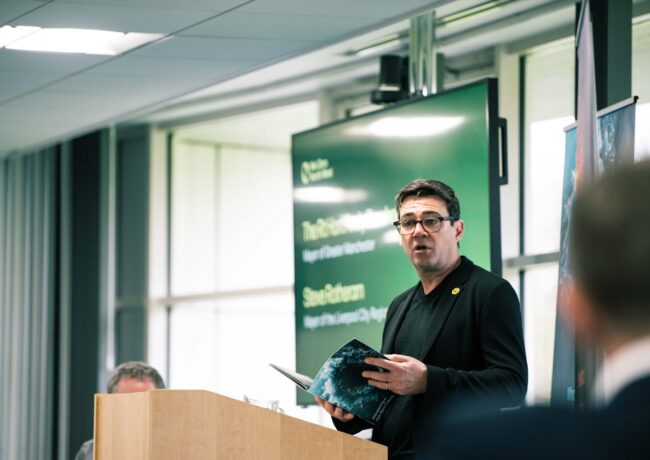Northern Transport Summit: 5 key takeaways
Political leaders gathered at Liverpool’s Maritime Museum to discuss what the North needs in order to achieve its goal of having a world-class transport system.
Place North West went along to hear what was said.
Trains bad
In a surprise to absolutely no one, the Northern Transport Summit was a train-dominated affair. Public confidence in the nation’s railways is at a generational low, prompting rail minister Huw Merriman to state his desire to “restore pride” in the system. Root and branch reform, investment in electrification and station improvements, and a focus on decarbonisation are his three top priorities, he told the summit.
In one of the spicier moments of the day, Henri Murison, director of Northern Powerhouse Partnership, berated a representative from Avanti West Coast. He said she should apologise for the “economic disaster” the company’s service had caused. She obliged.
Buses good
While railways bore the brunt of speakers’ ire at the summit, there was a lot of love for buses. Greater Manchester Mayor Andy Burnham described them as the “backbone” of the country’s transport system. The Greater Manchester Combined Authority takes back control of its buses in seven months. In the meantime, the £2 fare cap has already rolled out.
There was also one of Merseytravel’s new hydrogen buses outside Liverpool’s Maritime Museum. Attendees were invited aboard to hear about how the vehicle, one of 20 operating across the city region, is helping with the fight against climate change. The buses are capable of travelling 200 miles a day without a top-up and, most importantly, emitting precisely zero carbon into the atmosphere.
More power, please
Like the Convention of the North in January, one of the key messages from leaders at the Northern Transport Summit was a call for more power for local leaders. Devolution to the regions, they argue, would accelerate improvements and allow for transport services to be tailored to the needs of residents.
Murison received one of the few rounds of applause doled out by the audience when he ended a rant about the poor state of connectivity across the North by demanding the North be given the tools to “take its destiny in its own hands”.
Merriman was open to the idea of devolution. Answering a question from Place North West, he said that the soon-to-be-established Great British Railways governing body would be “all about the regions”.
“Where matters are devolved you sometimes get better ideas than those that are the status quo,” he said.
Integration for the nation
Former Olympic cyclist Chris Boardman championed a holistic approach to transport, linking up different modes to create seamless journeys from the first mile to the last.
“If the first mile is hard, people will just get in the car”, he said.
Liverpool City Region Mayor Steve Rotheram said Liverpool was a good example of how to integrate services fully. The city centre offers a variety of different transport modes including bus, train, underground, and ferry – as well as e-scooters for those first and last-mile trips.
Andy Burnham’s vision of a transport “Death Star” is taking shape, too. With trams, buses, and bikes due to be under GMCA control by January 2025, the Metro Mayor is looking at the next phase of integration. Speaking on a panel with his fellow city region mayors, he said he wanted to bring commuter train services that start outside GM into the Bee Network. This would allow commuters from as far as Buxton and Southport to take advantage of the network’s benefits.
Active travel arguments
The benefits of promoting active travel were extolled throughout the day. Boardman said the environmental impact of making it easier to walk and cycle should be the central point of all decision-making when it comes to transport. By considering the “carbon thread – everything else will fall into place,” he said.
North of Tyne Mayor Jamie Driscoll was one of many speakers to point out the health benefits active travel could have in terms of tackling issues such as obesity, while Burnham warned that active travel is becoming part of the culture war.
“People are demonising 15-minute cities,” Burnham said, slamming the “devisive rhetoric” around some transport changes.
Burnham was responding to recent media reports highlighting opposition to the idea of accessible neighbourhoods. Chief among the critics has been Conservative MP Nick Fletcher, whose speech in Parliament against the 15-minute cities concept went viral earlier this month.
The Northern Transport Summit was organised by Devoconnect. More than 100 people attended.







More nonsense from a bunch of out of touch 🤡! Bring in better roads, less revenue collection from motorists! Concentrate on better housing , growing the borough’s and creating manufacturing jobs!
By Manc
Perhaps Burnham should ask why the traffic in Central Manchester has now ground to a halt, because he has turned all our dual carriageways into one lane, to accommodate the invisible man riding an invincible bike?
By Elephant
@Manc – No offence intended, but I don’t think your comment makes a lot of sense.
‘Better roads’ tends to simply create more demand for car travel, leading to more congestion down the line (“induced demand”), and the region’s current overreliance on cars (relative to cities that have an extensive integrated public transport system like London, or European cities where public transport is much more affordable) is a barrier to building new, better housing (planning approval seems to forever being denied due to ‘lack of parking’ even where a development would be next to an extremely busy bus route and within a 5 minute walk of a Metrolink stop, because the expectation is that national public transport is so bad that people will “need” a car anyway).
And anyone who doesn’t think rail improvement needs to be a priority for the region either lives a charmed life or a sheltered one – those who regularly rely on trains in the North, and the North West in particular, talk of little else, in my experience.
By Salfordian
Steve Rotheram sidestepped the fact that large sections of the city of Liverpool have no train service, even though old lines exist and in some cases tracks are still present , these are places like Gateacre, Childwall, West Derby, yet he persists in wanting to spread the Merseyrail network to places like Preston and Wigan.
I am ok with extending to Skelmersdale or Deeside but for now he needs to build more stations within Merseyside as after all we, the citizens, have paid for the new trains.
By Anonymous
Another talking shop…
By GQ
Manchester would benefit from a London Overground style system! Anything outside the Metrolink network is a nightmare
By Anonymous
A load of hot air again!
By Digbuth O'Hooligan
Steve Rotheram is now saying that Liverpool has missed out on having a tram system and it would now take 10 years to get something up and running, well I say don`t give up but get on with it, as being negative gets you nowhere. Anyway he`s been in power for 5 years so if he had started lobbying right away he would only now have 5 years to wait.
By Anonymous
We have enough buses and cycle lanes etc- what we need is improvements to major road networks – such quickier access through the tunnels, a tunnel under the rocket fly over, more dual carriage ways in and around the city
By Stuart wood
Greater Manchester and Liverpool City Region should integrate all their infrastructure – transport, police etc and have one mayor. HS3 should be built to free up capacity within the region so it could develop a interregional rail network akin to the London Overground. Warrington should become part of LCR because it’s ridiculous that they think they’re a Cheshire town. All green belt land around Runcorn, Widnes, Warrington, St Helens and Wigan should be delisted and built on. Why not?
By DtcH
I don’t understand the “Death Star” analogy, other than some people refer to Merseytavel’s building by thta name (which is a fact not referenced in the article).
By Death Star